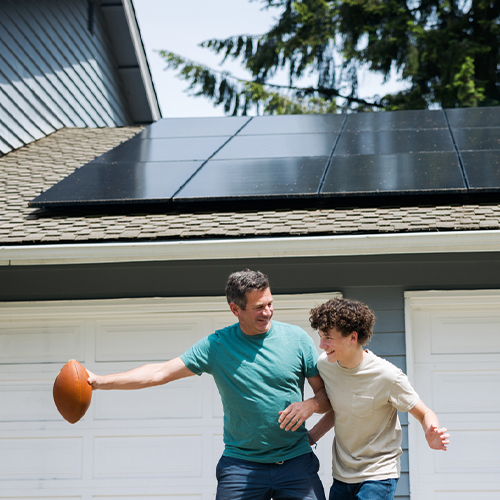Why Western Washington Relies on Rhema
Common Questions About Solar Panels & Alternative Energy Solutions
Solar energy systems convert sunlight into electricity using photovoltaic (PV) panels. When sunlight hits the panels, it generates direct current (DC) electricity, which an inverter converts to alternating current (AC), making it usable for your home or business.
Depending on your setup, solar energy can be used immediately, stored in batteries, or sent back to the utility grid. In commercial systems, solar energy often powers specific operations or offsets peak energy demand.
When your solar system generates more electricity than you use, the excess can be sent back to the utility grid through a process called net metering. You receive a credit on your electric bill, reducing your overall costs.
Homes and businesses with solar often save 50% or more on monthly electricity bills, depending on system size, usage, and local energy rates. Over time, these savings can significantly offset the installation cost, especially when combined with tax credits or rebates.
Installing solar panels involves working with high-voltage systems and integrating the setup into your building’s electrical infrastructure. A licensed electrician guarantees your system is installed safely, up to code, and configured correctly to prevent issues like overload, backfeeding, or fire risk.
This expertise is especially critical for commercial properties when integrating solar with backup systems, automation, or complex electrical loads.
There are several renewable energy technologies that homeowners can use to reduce dependence on the grid and lower long-term utility costs. The right system for your home depends on your location, property layout, and overall energy needs. Popular options include:
- Solar Panels (Photovoltaic): Convert sunlight into electricity
- Solar Water Heaters: Use solar energy to heat water
- Wind Turbines: Generate power through wind and require integration with your main electrical panel
- Geothermal Heat Pumps: Provide heating and cooling through buried loops connected to indoor electrical systems
- Battery Storage Systems: Store excess energy from solar or wind systems for use during outages or peak times
- Solar-Integrated EV Chargers: Allow you to charge electric vehicles using clean, renewable energy sources
Each system must be safely wired, grounded, and often permitted. Our experienced electricians make sure it’s done right.
Most systems are built for durability and require minimal upkeep:
- Solar panels need periodic cleaning and should be checked annually for performance and wiring
- Wind turbines require mechanical inspections every 6–12 months due to moving parts
- Geothermal systems should be serviced annually to check fluid levels, pumps, and system efficiency
- Battery storage systems should be monitored for charge cycles and safety settings
Working with a professional for scheduled maintenance ensures long-term reliability and optimal performance.

